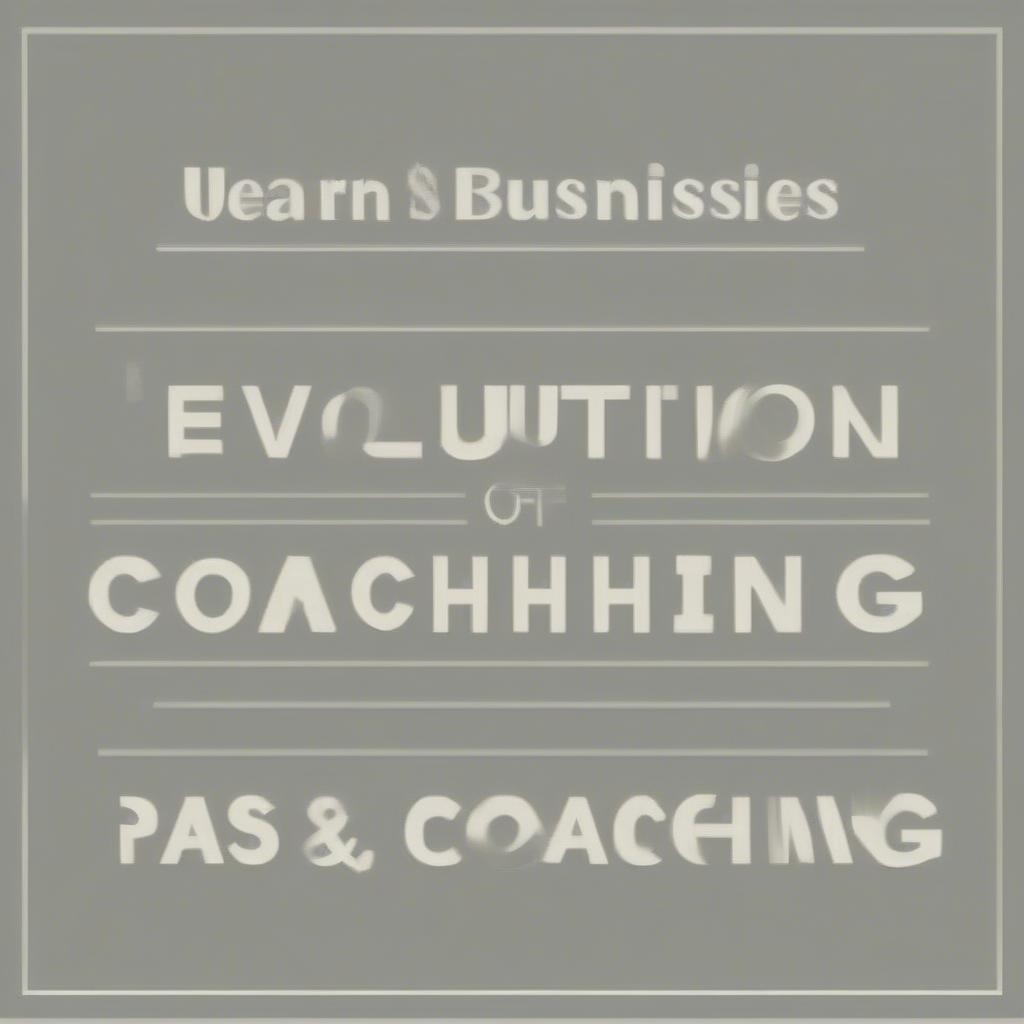
Why Coaching Collaboration is a Game-Changer
In the often-solitary world of coaching, it’s easy to feel like you’re on an island, navigating client challenges and business growth alone. But what if you could tap into a network of fellow professionals, sharing knowledge, resources, and support? That’s where coaching collaboration comes in. It’s not just a nice-to-have; it’s a powerful growth strategy that can accelerate your journey and amplify your impact.
The Power of Shared Knowledge
Imagine having a diverse panel of experts at your fingertips – people who understand the nuances of coaching and can offer fresh perspectives on your practice. Collaboration provides access to a wealth of knowledge that goes beyond your own experience. By connecting with other coaches, you can learn new techniques, explore different niches, and stay ahead of industry trends. This shared learning is invaluable for continuous professional development.
Amplifying Your Reach
Another significant benefit of coaching collaboration is the expansion of your reach. When you team up with other coaches, you’re essentially introducing your brand and expertise to their audience, and vice versa. This cross-promotion can significantly broaden your client base and boost your visibility in the market. It’s a powerful way to build your reputation and solidify your position as an authority in your field.
Support and Accountability
Let’s face it, running a coaching business can be challenging. From marketing struggles to client roadblocks, there are times when you might feel overwhelmed. Coaching partnerships offer a supportive network where you can share your struggles, seek advice, and celebrate wins. Knowing that you have colleagues who understand your journey can alleviate the feeling of isolation and provide the accountability you need to stay focused on your goals.
When to Seek Coaching Collaboration
Knowing when to engage in coaching collaboration is as crucial as understanding why. It’s not about randomly reaching out to any coach you encounter; it’s about being strategic. Here are some key moments that signal it’s time to seek partnerships:
When Feeling Stagnant
If your coaching practice feels like it’s plateauing, it might be time to look outwards. Collaboration can inject new energy into your business by exposing you to new ideas and methodologies. It can break you out of routine thinking and reignite your passion for your work.
When Expanding Your Niche
Want to dive into a new area of coaching? Instead of starting from scratch, partner with someone who already has expertise in that area. This can significantly reduce your learning curve and help you build credibility more quickly. A strategic partnership can make your niche expansion smoother and more successful.
When Seeking New Clients
If you’re looking to attract new clients, collaboration can be a cost-effective way to reach a wider audience. Partnering with coaches who cater to a similar but not overlapping clientele can introduce you to a whole new pool of potential clients, exponentially increasing your visibility.
When Building a Community
Sometimes, the primary reason for coaching collaboration isn’t just about business growth, it’s about fostering a community. If you crave a supportive network of like-minded professionals, then building partnerships is vital for personal and professional growth.
How to Find the Right Coaching Collaborators
The success of any collaborative venture depends on finding the right partners. Here are some steps to guide you through this crucial process:
Define Your Goals
Before reaching out to potential collaborators, take some time to define your goals. What do you hope to achieve through coaching partnerships? Are you looking to expand your niche, increase your referrals, or simply build a supportive network? Being clear about your goals will help you find coaches who align with your needs.
Identify Potential Partners
Start by considering coaches you already know or admire. Look for people with complementary skills and a similar client base. Consider people from different coaching niches, as this will offer unique and new perspectives. Your ideal partners should share your values and be genuinely invested in mutual growth.
Conduct Thorough Research
Before making a formal proposal, conduct thorough research on potential partners. Review their websites, social media profiles, and client testimonials. Look for consistency and a professional presence. Ensure that their work aligns with your ethical standards.
Initiate Meaningful Conversations
Reach out to potential partners with a genuine and personalized message. Express your interest in their work and your desire to explore potential collaborations. Avoid generic outreach messages. Make it clear what you bring to the table and what you hope to gain. The key is to build a genuine human connection first.
Discuss Expectations
Once you’ve found a potential collaborator, openly discuss expectations. Outline your collaborative goals, responsibilities, and desired outcomes. Clearly define how you’ll track progress and address potential conflicts. A clear agreement from the outset is essential for a smooth and productive partnership.
Types of Coaching Collaboration: A Practical Guide
Coaching collaboration can take many forms. Here are some practical examples and detailed strategies to guide you:
Joint Webinars and Workshops
Co-hosting webinars or workshops is a fantastic way to showcase your combined expertise and attract new clients.
Steps to Successful Joint Webinars:
- Choose a Relevant Topic: Select a topic that aligns with both of your areas of expertise and appeals to a broad audience.
- Create a Compelling Title: Develop a catchy title that will grab attention and clearly communicate the value of the webinar.
- Promote Strategically: Leverage your combined audiences through social media, email marketing, and other channels.
- Deliver High-Value Content: Ensure the webinar is packed with actionable insights and engaging content that leaves a lasting impression.
- Follow Up: Send follow-up emails with relevant resources and a call to action to turn attendees into clients.
Referral Partnerships
Establishing referral partnerships with other coaches is a simple yet highly effective way to grow your business.
How to Build Strong Referral Networks:
- Identify Complementary Coaches: Seek out coaches who work with similar clients but offer different services.
- Establish a Referral Agreement: Outline the referral process and any potential incentives.
- Educate Each Other: Be clear about the type of clients you are seeking to refer.
- Track Referrals: Keep track of referrals to measure the success of the partnership.
- Regularly Check-in: Check-in regularly with referral partners to ensure the system is functioning effectively and address any issues that arise.
Joint Content Creation
Collaborating on content creation, such as blog posts, articles, podcasts, or e-books, can significantly expand your reach and establish you as experts in your field.
Strategies for Joint Content Creation:
- Choose a Topic: Select a topic that aligns with your combined expertise.
- Assign Roles: Clearly define who will be responsible for writing, editing, or recording.
- Set a Schedule: Create a realistic timeline and stick to it to ensure timely delivery.
- Promote the Content: Maximize your reach by promoting the content through your social media, newsletters, and websites.
- Re-purpose Content: Re-purpose content for various media channels.
Peer Mentoring and Support Groups
Forming peer mentoring or support groups can provide a safe space for mutual growth and shared learning.
How to Create Effective Peer Mentoring Groups:
- Identify Like-minded Coaches: Gather coaches who share similar experiences and goals.
- Establish Group Guidelines: Set clear expectations for participation and confidentiality.
- Schedule Regular Meetings: Hold regular meetings or virtual calls to discuss challenges and celebrate successes.
- Offer Feedback: Create a culture of constructive feedback and mutual support.
- Commit to Growth: Encourage a focus on individual and collective growth.
Templates and Tools for Successful Collaboration
To help you get started, here are some sample templates and tools you can use:
Collaboration Agreement Template
- Introduction: Briefly introduce both parties and their purpose for collaboration.
- Goals and Objectives: Clearly define the goals and desired outcomes of the partnership.
- Responsibilities: Outline each party’s roles, responsibilities, and tasks.
- Timeline: Set a timeline for each aspect of the collaboration.
- Communication: Specify preferred communication channels and frequency.
- Conflict Resolution: Create a plan for resolving any potential conflicts.
- Confidentiality: Set the terms for maintaining confidentiality and information security.
- Termination: Outline the procedures for ending the collaboration.
- Signatures: Provide space for all parties to sign and date the agreement.
Collaboration Project Tracker
- Project Name: Define the project clearly.
- Task List: Break down the project into smaller, actionable tasks.
- Assigned Person: Clearly specify who is responsible for each task.
- Due Date: Set realistic deadlines for each task.
- Status: Update the status of each task (e.g., to-do, in progress, completed).
- Notes/Updates: Add any relevant notes or updates to the tracker.
Referral Tracking Sheet
- Referral Date: Note the date of each referral.
- Referral Partner: List the name of the coach who made the referral.
- Client Information: Collect basic information about the referred client.
- Outcome: Record whether the client became a paying client.
- Referral Fee: Track any referral fees.
- Notes: Add relevant information about the referral.
The Benefits of Coaching Collaboration: A Summary
In a nutshell, coaching collaboration offers a multitude of benefits, including:
- Expanded Knowledge and Skills: Learn from the expertise of other coaches and stay current with industry trends.
- Increased Visibility and Reach: Tap into new audiences through cross-promotion and partnerships.
- Enhanced Support and Accountability: Benefit from a supportive network and stay motivated to reach your goals.
- Improved Business Growth: Generate new leads, referrals, and income streams.
- Personal and Professional Development: Experience continuous learning and growth through the process of working with other professionals.
Learn Business: Your Partner in Collaborative Growth
At Learn Business, we understand that navigating the complexities of a coaching business requires more than just passion; it demands a solid strategy and access to the right resources. That’s why we are dedicated to supporting coaches like you in your journey towards sustainable growth through tools and insights tailored to your needs.
Our platform offers a wide range of resources including:
- Business Templates: Ready-to-use templates designed to streamline your business operations. This includes client onboarding templates, proposal templates, social media content plans and more.
- Strategic Guidance: In depth articles, courses and guides to help you navigate the various stages of building a coaching business, including how to successfully set up and manage collaborative partnerships.
- Community Support: A place to connect with a network of like-minded entrepreneurs and exchange ideas.
- Business Planning: Guides for setting business goals and strategies.
- Marketing Materials: Content tailored to help you connect with your target audience and grow your coaching practice.
We’re not just a resource provider; we’re your partner in growth. By utilizing the tools and guidance offered by Learn Business, you’ll be better equipped to implement successful coaching collaboration, optimize your business strategies, and achieve the impact you’ve always envisioned.
Conclusion: Embrace the Power of Coaching Collaboration
The journey of a coach can be a rewarding but challenging one. However, with strategic coaching collaboration, you can transform that journey into a shared path of growth, learning, and success. By embracing the principles outlined in this article, you’ll be able to leverage the power of partnerships to amplify your impact, expand your reach, and create a more fulfilling and prosperous coaching practice. Start exploring the possibilities of collaboration today and unlock the potential for mutual growth.



Leave a Reply